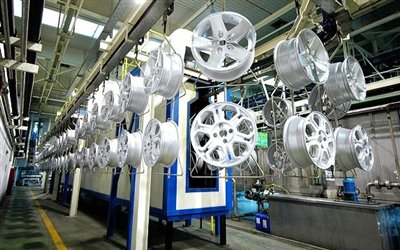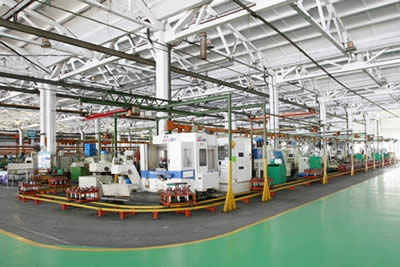Best Mixer Shower,Bath Shower Mixer,Bath And Shower Mixer,Wall Mounted Shower Mixer Kaiping City Yibiao Sanitary Ware Co., Ltd. , https://www.faucetsaoli.com
In recent years, with the development of the economy, Chinese companies have improved their own strengths. Overseas mergers and acquisitions have become new ways for Chinese companies to seek development, and many of these are related to the automotive business. For example, Beijing West Heavy Industries acquired the Delphi brake and suspension business in the United States, Beijing Pacific Century Corporation acquired the global global steering and transmission business, Ningbo Huaxiang acquired the real wood manufacturing center of the British Jaguar Land Rover, and Wanxiang acquired the US DS steering axle business. Industry insiders pointed out that in the next 5 to 10 years, in the auto parts industry, there will be an upsurge of overseas mergers and acquisitions by Chinese companies.
In the process of Chinese companies going abroad and acquiring overseas parts and components companies, German parts and components companies have become the “Xiangshan†of Chinese companies’ cross-border M&As. The reasons are mentioned in the industry:
One is technology leadership. Chinese investors hope to acquire core technologies through such acquisitions. The second is the scale. A large number of SMEs in Germany are limited by the scale, and the overall purchase price is not high, which is suitable for Chinese corporate mergers and acquisitions. The third is customer quality. Some parts and components companies in Germany are often supporting complete vehicles such as Volkswagen, BMW and Mercedes-Benz. The acquisition is beneficial to the development of European customers. The fourth is government promotion. In order to ensure national employment, the European government can even obtain financing and support from the local government as long as the buyer promises to guarantee employee benefits and pensions.
At the outbreak of the international financial crisis, some German auto parts companies with technical strengths were able to reborn by being acquired by financial investors. After the financial crisis, as some investors considered exiting cash, both the company itself and the OEMs it cooperated with hoped to find new investors as soon as possible. Such business opportunities were discovered by Chinese companies and they actively pursued the "save" plan across the sea.
“The German vehicle company hopes to continue to maintain the supply relationship with the acquired companies through overseas acquisitions by Chinese companies, thereby guaranteeing the stable development of the acquired companies to a certain extent; Chinese companies can acquire core technologies by acquiring foreign companies. Recognition of German vehicle companies for cooperation in more fields." With the continuous improvement of Chinese companies' commodity production in all aspects of the value chain and the transformation of the economy into consumption-driven transformation, China's strategic investors have regard to foreign industry technology and consumer brands. The more enthusiastic.
In the past, some Germans were biased against Chinese investors. They believe that Chinese companies will close factories after acquiring certain resources through acquisitions. "The possibility of technology transfer after mergers and acquisitions is not ruled out. In a sense, this is also consistent with the law of international economic and trade development. For example, China currently has a part of low-value-added processing industries that are shifting outwards. But on the other hand, If you look at pure mergers and acquisitions, it does not guarantee that companies will gain lasting innovation. At the same time, many acquisitions are accompanied by joint commitments and restrictions. Close factories are often subject to corporate contracts and local government restrictions. Therefore, simply think that China It will be one-sided to shut down the factory after the technology is bought, and Germans are gradually aware of this," said Roland Berger. 
How to determine the positioning of the German market in the company's international development strategy has become a problem that urgently needs to be resolved after the acquisition of Chinese companies. “Chinese investors have their own advantages in conducting mergers and acquisitions. For example, the Chinese government encourages policies; the Chinese auto market has great potential; more abundant funds, etc. At the same time, investors should also see their own weaknesses, such as the lack of globalization. Multinational operational experience; Lack of experience after mergers and acquisitions; Insufficient number and quality of overseas management resources, especially those with cross-cultural management capabilities; Systematic constraints, etc.†Experts suggest that Chinese companies must do a good job before investing in Germany. Prepare enough to avoid detours.
It is reported that after the negotiations on the acquisition of Saguchi in Germany by Chongqing Light Textile, the president of the group, Zhang Wenqing, used the phrase “it is really hard†to describe the negotiation process. The strength of competitors, differences in Chinese and foreign cultures, and differences in foreign legal systems have made senior executives of domestic established companies realize that the road to Germany's acquisition is fraught with difficulties. It is reported that at the time, they also needed to negotiate with Sagami Group and its shareholders, six banks, six OEM OEMs, and two trade unions.
Extensive reading:
PricewaterhouseCoopers said in its report that in the first half of 2011, the overseas M&A transaction activity of mainland companies reached a record high of 107, an increase of 14% compared with the same period of last year. It is expected that the overseas M&A transactions of domestic enterprises in the second half of the year will still maintain a strong growth momentum, and the total number of M&As in the year will see double-digit growth. The data also shows that during the first half of this year, China’s overseas M&A transactions with European companies increased significantly. In the first half of the year, 30 transactions were completed, compared with 27 in 2010. In connection with this, M&A transactions in Europe are mainly concentrated in the industrial manufacturing and consumer industries. Asia's other countries remain the most popular M&A destination for domestic investors. In the first half of the year, 33 transactions occurred in Asia, an increase of 17% over the same period. Only Japan and Singapore alone had 9 and 7 M&A transactions.